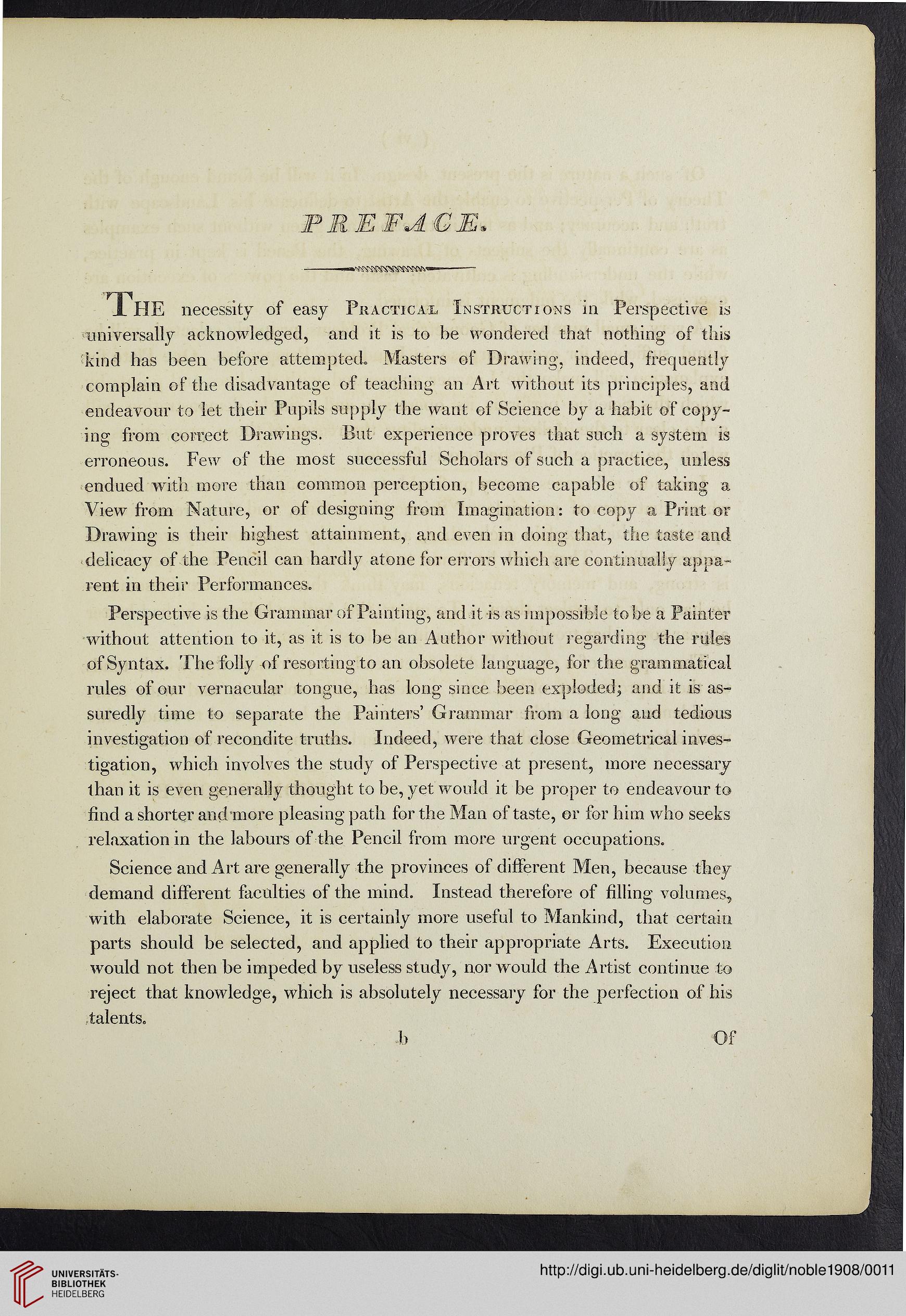PREFACE.
necessity of easy Practical Instructions in Perspective is
universally acknowledged, and it is to he wondered that nothing of this
kind has been before attempted. Masters of Drawing, indeed, frequently
endeavour to let their Pupils supply the want of Science by a habit of copy-
ing from correct Drawings. But experience proves that such a system is
erroneous. Few of the most successful Scholars of such a practice, unless
endued with more than common perception, become capable of taking a
View from Nature, or of designing from Imagination: to copy a Print or
Di ’awing is their highest attainment, and even in doing that, the taste and
delicacy of the Pencil can hardly atone for errors which are continually appa-
rent in their Performances.
Perspective is the Grammar of Painting, and it is as impossible lobe a Painter
without attention to it, as it is to be an Author without regarding the rules
of Syntax. The folly of resorting to an obsolete language, for the grammatical
rules of our vernacular tongue, has long since been exploded; and it is as-
suredly time to separate the Painters’ Grammar from a long and tedious
investigation of recondite truths. Indeed, were that close Geometrical inves-
tigation, which involves the study of Perspective at present, more necessary
than it is even generally thought to be, yet would it be proper to endeavour to
find a shorter and’more pleasing path for the Man of taste, or for him who seeks
relaxation in the labours of the Pencil from more urgent occupations.
Science and Art are generally the provinces of different Men, because they
demand different faculties of the mind. Instead therefore of filling volumes,
with elaborate Science, it is certainly more useful to Mankind, that certain
parts should be selected, and applied to their appropriate Arts. Execution
would not then be impeded by useless study, nor would the Artist continue to
reject that knowledge, which is absolutely necessary for the perfection of his
complain of the disadvantage of teaching an Art without its principles, and
talents.
h
Of
necessity of easy Practical Instructions in Perspective is
universally acknowledged, and it is to he wondered that nothing of this
kind has been before attempted. Masters of Drawing, indeed, frequently
endeavour to let their Pupils supply the want of Science by a habit of copy-
ing from correct Drawings. But experience proves that such a system is
erroneous. Few of the most successful Scholars of such a practice, unless
endued with more than common perception, become capable of taking a
View from Nature, or of designing from Imagination: to copy a Print or
Di ’awing is their highest attainment, and even in doing that, the taste and
delicacy of the Pencil can hardly atone for errors which are continually appa-
rent in their Performances.
Perspective is the Grammar of Painting, and it is as impossible lobe a Painter
without attention to it, as it is to be an Author without regarding the rules
of Syntax. The folly of resorting to an obsolete language, for the grammatical
rules of our vernacular tongue, has long since been exploded; and it is as-
suredly time to separate the Painters’ Grammar from a long and tedious
investigation of recondite truths. Indeed, were that close Geometrical inves-
tigation, which involves the study of Perspective at present, more necessary
than it is even generally thought to be, yet would it be proper to endeavour to
find a shorter and’more pleasing path for the Man of taste, or for him who seeks
relaxation in the labours of the Pencil from more urgent occupations.
Science and Art are generally the provinces of different Men, because they
demand different faculties of the mind. Instead therefore of filling volumes,
with elaborate Science, it is certainly more useful to Mankind, that certain
parts should be selected, and applied to their appropriate Arts. Execution
would not then be impeded by useless study, nor would the Artist continue to
reject that knowledge, which is absolutely necessary for the perfection of his
complain of the disadvantage of teaching an Art without its principles, and
talents.
h
Of




